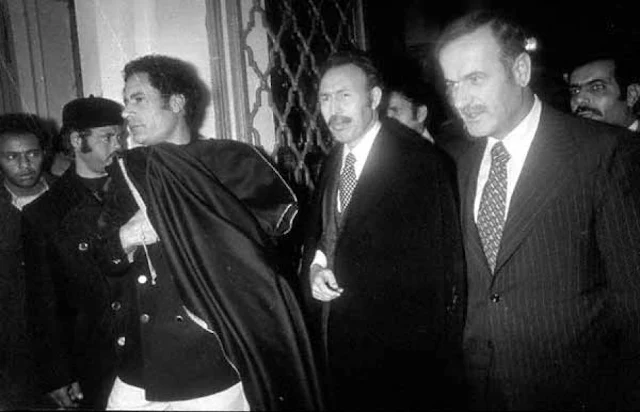Among the members of the Steadfastness and Confrontation Front, created in 1977 to oppose normalization with Israel, only Algeria remains standing. Today, caught between regional pressure, tensions in Western Sahara, and instability in the Sahel, the country faces a renewed campaign of destabilization. This is the chronicle of a stubborn defiance.
A Stand Taken in 1977
On December 4, 1977, in Tripoli, the Steadfastness and Confrontation Front was born as a response to Anwar Sadat’s shocking visit to Israel. For much of the Arab world, the Egyptian president’s gesture was seen as a betrayal of the Palestinian cause. In response, Algeria, Libya, Syria, South Yemen, and the Palestine Liberation Organization (PLO) came together in a resolute rejection of normalization. Forty-seven years later, that front exists only in the annals of diplomacy. Its members have been weakened, overthrown, or thrown into chaos. All, except one: Algeria.
A Historic Constant: Algeria’s Loyalty to Its Principles
From the earliest days of its independence, Algeria asserted itself as a pillar of the Arab progressive camp. Under Houari Boumédiène, it became a steadfast defender of Palestine and liberation movements around the globe. During the Yom Kippur War in 1973, Algeria discreetly sent $200 million worth of arms to Egypt and Syria. Seeking neither praise nor recognition, Boumédiène explained his silence with one word: modesty. “We know the price of blood...”
Less than a decade later, Algeria provided direct military support to the PLO during Israel’s invasion of Lebanon in 1982. Soviet arms, Algerian stockpiles, humanitarian aid—the commitment was real, discreet, but crucial in the defense of West Beirut. At a time when Arab capitals competed in fiery rhetoric, Algiers acted.
A Dismantled Front, an Isolated Algeria
The fate of the Front’s other members is tragic. Gaddafi’s Libya was shattered by NATO. Syria sank into a seemingly endless war. South Yemen disappeared into an uneasy union with the North, only to be consumed by renewed conflict. Palestine remains more divided than ever and subjected to unrelenting repression.
Algeria, the lone survivor, has paid dearly for its independence of thought. The 1990s—its so-called “Black Decade”—left deep scars. Yet the country held firm. It rejected IMF loans, preserved its sovereign diplomacy, and resisted the lure of normalization.
Morocco and Israel: An Unnatural Alliance, a New Pressure
Today, the threat no longer comes solely from the Middle East—it is closer and more direct. Since Morocco and Israel resumed diplomatic ties in 2020, tensions between Algiers and Rabat have reached a boiling point. At stake: the U.S. recognition of Moroccan sovereignty over Western Sahara, followed recently by France. In Algiers, many see this as a provocation, an attempt to push the country into military action in the name of its historic support for the Sahrawi cause.
The trap is clear: to lure Algeria into a regional war that would weaken it from within—just as has been done elsewhere. The strategy is subtle, sophisticated, and relies on media, political, and diplomatic channels.
The Southern Front: A Powder Keg in the Sahel
But Morocco is not the only fault line. To the south, the situation in Mali deeply concerns Algeria. With Russian mercenaries on the ground, fragile institutions in Bamako, and terrorist groups active across the Sahel, the threat is real. By surrounding Algeria with pockets of instability, certain actors aim to drain its resources, isolate it, and entangle it in endless crises.
The Elegance of Restraint, the Strength of Silence
Yet Algeria does not flinch. It resists through diplomacy, deepens its African alliances, multiplies multilateral initiatives, and maintains the silence of nations that have known war—and know its cost. It reaffirms its support for the Sahrawi cause without taking the bait, aware that a war waged under pressure is a war lost before it begins—politically, if not militarily.
Toward a Maghreb of Peoples, Beyond Subservient Monarchies
Far from the illusion of Arab unity celebrated at summits, Algeria now places its bets on a Maghreb of the peoples, truer to the spirit of anti-colonial struggles. Its foreign policy—often misunderstood—is marked by clear-eyed caution. Far from the noise, it builds bridges across Africa, weaves non-aligned alliances, and remains loyal to its founding values.
In an Arab world where capitulations are justified in the name of “realpolitik,” Algeria stands as an exception. A vulnerable one, perhaps—but proud and uncompromising.
Conclusion: A Solitude by Choice
Algeria moves forward alone—but with the memory of its struggles and a deep sense of responsibility. It has not changed sides, even as its former allies have. It has not forgotten that history is often written by those who resist, not by those who yield. The Steadfastness Front may no longer exist on paper, but in practice, it lives on—in the stance of a country that, against all odds, has never stopped saying no.
By Belgacem Merbah

Comments
Post a Comment